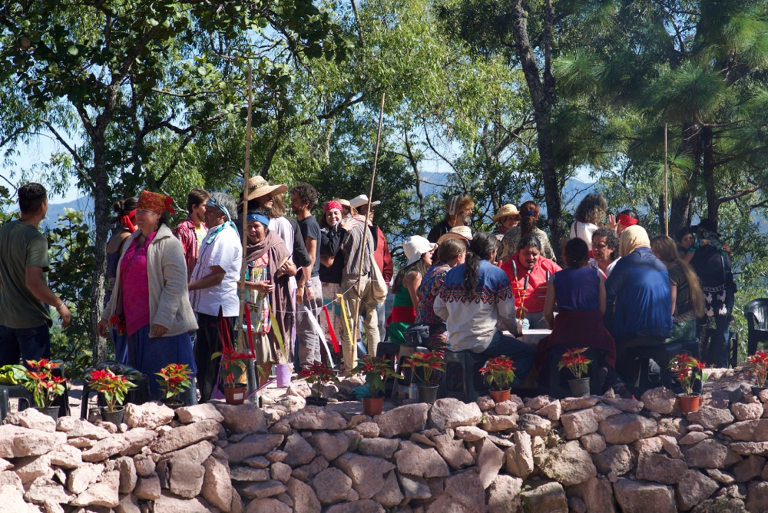Lakota Spiritual Activist Cheryl Angel believes in listening to her dreams – the ones that come to her at night as she sleeps, and the ones that arrive as messengers from the road as she travels the globe. She has been traveling extensively over the past two years, connecting with indigenous and non-indigenous women and people living in sustainable communities. Mexico in particular has been a rich source of inspiration as she has explored the best ways to take the Water Protector work to the next level. Those travels – and a sacred staff she was entrusted with – are what inspired the June 10-16 Sovereign Sisters Gathering that Cheryl is organizing this year in the sacred and besieged Black Hills of South Dakota.
This is the second part of a series of interviews with Cheryl Angel. See Part One: Many Standing Rocks: Three Years and Still Fighting. In Part Three she will share her insights from travels among ceremonial sites and communities in Mexico.
Here, Cheryl shares the story about the dream-led Sovereign Sisters Gathering, and how it came to be.
Esperanza Project: What is the Sovereign Sisters Gathering, and how did it come about? When you say it is dream led, can you tell me more about that?
Cheryl: The Sovereign Sisters Gathering initially came from my deep gratitude for the women who were essentially the backbone of the occupation at Standing Rock. I wanted to gather them all and say thank you for your support, your knowledge, your bravery, your perseverance, your kindness, your generosity, your sharing of everything to make the occupation at Standing Rock into a community of water protectors.
I wanted to create a circle of healing for their traumas to be healed. I felt I needed to offer a Wopila in the Black Hills for the women who had supported me during my occupation at Standing Rock. So a year ago I invited women who were vital to the occupation at Standing Rock and we offered prayers at Sacred Sites. I made a prayerful pledge at each site that I would bring more prayers to awaken the spirits leaving footprints on the lands and also to bring more water protectors to defend the “Sacred Black Hills — HeSapa — the heart of everything that is” from further exploitation and destruction.
Water Protector, artist and Indigenous leader Lyla June Johnston on the Sovereign Sisters Gathering.
Fast forward to September 14th of 2018 at the Aniwa Gathering in New York, where I stood alongside a delegation of Indigenous leaders from several foreign countries to unite in a global prayer for the people at the World Trade Center. Later that day I reunited with a woman whom I first met at the Ríos Vivos (Living Rivers) Festival to save the river Atoyac in Puebla, Mexico. She handed me this box and said, inside this box is the woman’s staff, the Staff of Light – from Peru. Accepting that box and learning about the responsibilities of the staff changed my life and gave me a vision that I have carried with me to this day.
I flew back to South Dakota with it and drove all the way from South Dakota to California, and I was alone with that staff in the car at several points. And every time I was alone with it, I felt this overwhelming need to pray. I felt that I was in ceremony, so I kept praying, and praying, and then I realized that it was only happening when I’m alone with the Staff of Light.
Then I started having these dreams of women working with water and working with the elements, dreams of them living a sustainable life in a community free of violence, free of hate and illness – and I don’t even know what day it was when I woke up and said – “Wow, these are the economies that we have been missing!”
These past few years I’ve talked about how devastating extraction economies are to the environment and how the system needs to be stopped and replaced – but I never thought much about what we are going to replace it with. But actually, subconsciously, I was searching — because when I had the staff, all of a sudden I had these dreams and these thoughts …. Now I understand that sustainable sovereign economies are needed to replace the system we support with our purchasing power, and our ancient teachings have all of those economies passed down in traditional families. I found myself in small hidden communities where groups participating in ceremonies were there to learn, internally and quietly saying, “Teach us; guide us; show us the way.”
This planet has been sustaining every soul since our first breath of life, Woniya Wakan. However it has always been the ancestral teachings and lifeways of Indigenous cultures that recognize and abide by the natural law of the land. It’s not the government, it’s not the state, it’s not the county – it’s the land that sustains us. Land is alive! But today the majority of the people, we’re not treating it like it’s alive, we’re not treating it like it’s a family member. And yet despite our indifference, the planet is still trying hard, to continue to live, to continue to sustain all life. It’s very evident we need to change our behavior toward the earth, and choose a better economy to sustain ourselves, an economy that doesn’t destroy the planet, one that recognizes the natural laws of the land.
So just before I had gotten this staff I was determined to have a women’s gathering because I wanted hear women’s stories. I wanted to let those stories fill me with information and guidance. I’ve been listening to the elders for a long time, and I’ve been traveling everywhere in Mexico, India and Nepal, listening to elders in sacred places. I’m not the one with the answers, Creator has the answers. And people have stories that need to be listened to and women have the stories that paint a picture of reality. Our realities as women are shared, so the effort to create a better reality comes from our own stories. Those are the stories that need to be told, those are the stories that will be brought to the Black Hills of South Dakota, to the HEART of everything that is.
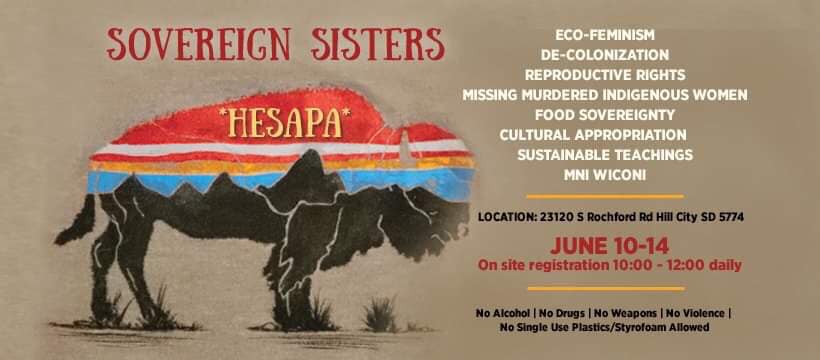
When I was given the staff I immediately took it, put it in the ground and made an altar for it – and I told people about it, and I said that if they needed prayers, then they should go there. And I fed it water and fruit. Later I learned that it was called the Staff of Light and it was created in Qorikancha, Peru, by the circle of wise grandfathers and grandmothers of the planet. They saw the destruction on the Earth and they prayed. They asked what could be done to save the planet and get the people back on track, to live out their lives in peace and with dignity.
And they created two staffs, in duality, to establish the balance, a feminine staff and a masculine staff. They sent these two staffs along with a sacred cane on a journey together, moving from nation to nation to remind people that we have to live in harmony with all life on the planet, and to acknowledge each nation has teachings that are not only sustainable but are also about living naturally on the land — and they are recognizing that all nations have different cultures, different ceremonies and different sacred sites.
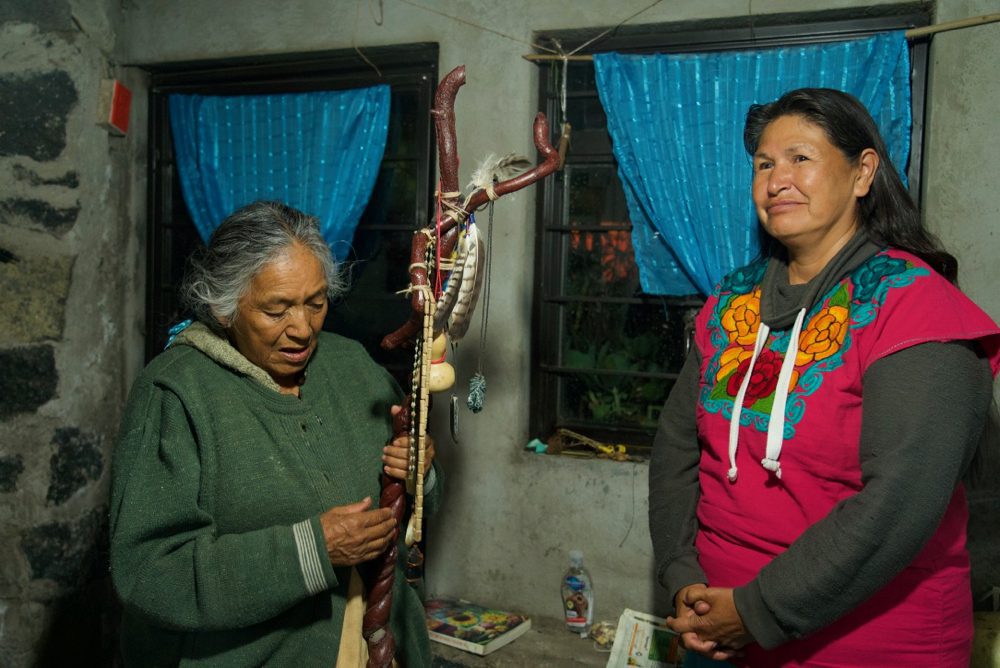
Abuela Amalia shares her Water Staff with Cheryl. (Photo: Anna Katarina Jones)
Soon after I received the Staff of Light, I was contacted by a group of women in Mexico –and they said, that staff has been missing, please bring it back – so I did. I flew here with the staff, and met all of the elders – they are grandfathers and grandmothers of the planet who meet and have ceremonies on the eclipses –they appointed me and another grandmother from Mexico to be the official carriers of the staff, a job that usually lasts a year. I told the grandmother that she should hold it the first six months and I would hold it for the second six months.
I was with this staff for maybe a month before I went to Mexico – and during that time I had the staff I felt completely different. My mind was always about the prayers of the people, and then I realized – see, this staff had gone to 12 countries before it came to me. Twelve. And they had ceremony and all the people came to pray with this staff, and I thought, Oh my goodness – I’m feeling all of the prayers that people put into this staff.
And all the prayers are for unity. The prayers are to stop all of the hardships that people are experiencing. And they are for the hope for the future, for the betterment of the human race, for our planet, for our condition, for our lives. And so the Staff of Light put me on this path where I began to think of the entire planet, and the need for unity and the need for us to treat the Earth as a living being.
I realized that the Earth is totally, 100 percent alive, and has rights to life. The rivers are 100 percent alive, and have rights to life. But I was raised in such a way that individuals have rights and only individuals can own things – but in a legal sense, I never thought about the rights of the Earth until I held that staff, and I thought – this planet has rights to life. And this planet is the source of life. If it weren’t for this planet, and if it weren’t for the water, we’d all be dead. It’s like we’re on this huge organic spaceship hurtling through space, spinning around the sun – it’s amazing, this organic living vehicle, this life force – and it is a life force.
I had a dream when I first arrived at Standing Rock: I had my arms and my legs wrapped around the Earth, and I was hugging the whole planet. And I was hanging on so tight – you know how you’re going around a Ferris wheel and you have to hold on or otherwise the centrifugal force will throw you off? So, I was hanging on for dear life, and I could feel the heartbeat of the planet. I could feel the heartbeat, the powerful bursts of energy and then relaxation. You know how the blood flows, it pumps out through your veins, and then it relaxes. That’s what I was feeling – I could literally feel the heartbeat of the planet.
And I’m thinking, this is alive. The planet is alive. Then I started falling asleep while I was holding onto the planet, like you would hold a child and protect it. After that I understand way more than I’ve ever understood — even though I thought I had a pretty good grasp on reality.
Life now, it’s all an illusion – all of these rules, all of these governments, all these genocidal policies that force people into wars, that force people to move from one space to another space. All these systems we hold up are an illusion, and the reality is that the Earth is alive and it has a heart that beats. It has a power and we are the foolish ones who think we are in charge and that we have the power – and we don’t. And in order for us to continue living on this paradise, we have to protect it. So we’ve got to stop being trash makers. We consume only about a tenth of what we create, and then we trash the rest. If aliens were looking at us or anyone was judging us from the outside, they’d say, “That’s a planet where they make trash, and kill each other instead of living in peace.” I want everyone to know… PEACE is a choice.
The way we have behaved in America is very wasteful and it’s devastating to the landscape. And so how can we get people back on track again? We can’t go on like this. Our soil is being destroyed for monocrops; the rivers are being killed by the tailings from mining operations. These things are happening everywhere. Lands are still being taken away, legally stolen from indigenous people since capitalism started; since colonization started, people have been losing their lands and their rights to their lands.
So the Circle of the Wise Grandfathers and Grandmothers created two staffs, the masculine and the feminine, as a pair signifying the duality of nature, including mankind, referred to as a Bastón, and these staffs travel from country to country and became a part of the protocol for the meetings held from country to country. And those staffs are to be carried and uplifted in ceremony in the land of the indigenous people – and all those things, the language, the culture, the ceremony, must live in balance within natural law, and all of those things need to be taught and remembered, so that people wouldn’t be dependent on capitalism and they wouldn’t be dependent on the system. People can use those skills to save their communities and stop the violence against women and the violence against children, and to keep the bad influences from harming their communities, like alcohol and drugs. And the Animal Nation and the Plant Nation need to be taken into consideration in the ways people are using the land, because more than humans are living there — so we need to be mindful of our relations.
So that’s what they were thinking about when they created these two staffs. And the Staff of Light is making its way north now. And it is coming to me in June, so I have to create a place for this staff to be. I have to create a place where people are working and living off the land and the water in a traditional manner.
Last December I was invited back down to Mexico for a ceremony, a Kiva ceremony, where we light the fire and the traditional languages are spoken. The foods are all traditional, the dress is traditional – there were 20 different countries represented, and it was amazing. I saw all these beautiful regalia and languages centered around prayer for the protection of the planet and her people.
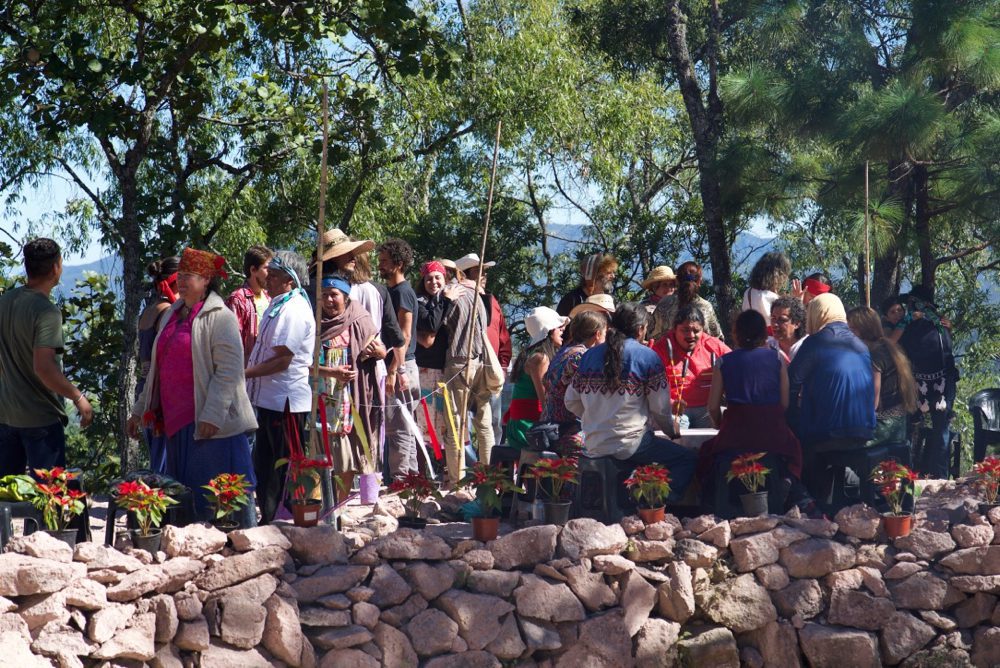
Traditional peoples from 20 different countries participated in the Raices de la Tierra Kiva Ceremony in Jalisco, Mexico. (Photo:Anna Katarina Jones)
So I wanted to create a venue in the Black Hills for people to tell their stories, especially women. And as I was traveling I learned and I saw with my own two eyes that they have sustainable economies. They have sovereign economies that were handed down from generation to generation about how to live in harmony with the Earth, each one in the environment they were raised in. I knew that was part of the answer.
I want to show all the women in America – from the northern tip to the southern tip – that sustainable economies are available to us, and that we need to support a network amongst us – so that we can live. We can create these economies around us.
Tracy: What do you mean when you say “sovereign economies”?
Cheryl: A sovereign economy is one where you base your work and your lifestyles according to your existence in harmony with the environment around you. Retaining your culture, your traditions, your language – that’s what I was shown. That’s my interpretation of what I was seeing.
And so when I look at Walmart now – seriously – and seeing how other people live, so simply and so purely, without chemicals – I go to Walmart or even Walgreens now, and all I see is rows and rows of harmful products that we’ve accepted and allowed to be brought into our lives because we’re blinded. We don’t understand the substances in these products are causing our own illnesses and our own imbalance. So I try not to go into any of those stores at all.
So if I have a dollar I’m going to spend it on something that’s handmade – and support that community that has a sovereign economy.
But this didn’t coalesce until that staff was put into my hands. And then everything I’ve ever thought about started to connect to everything else. And then going to the sacred sites and the communities in Mexico – and hearing the stories of the people and of the history.
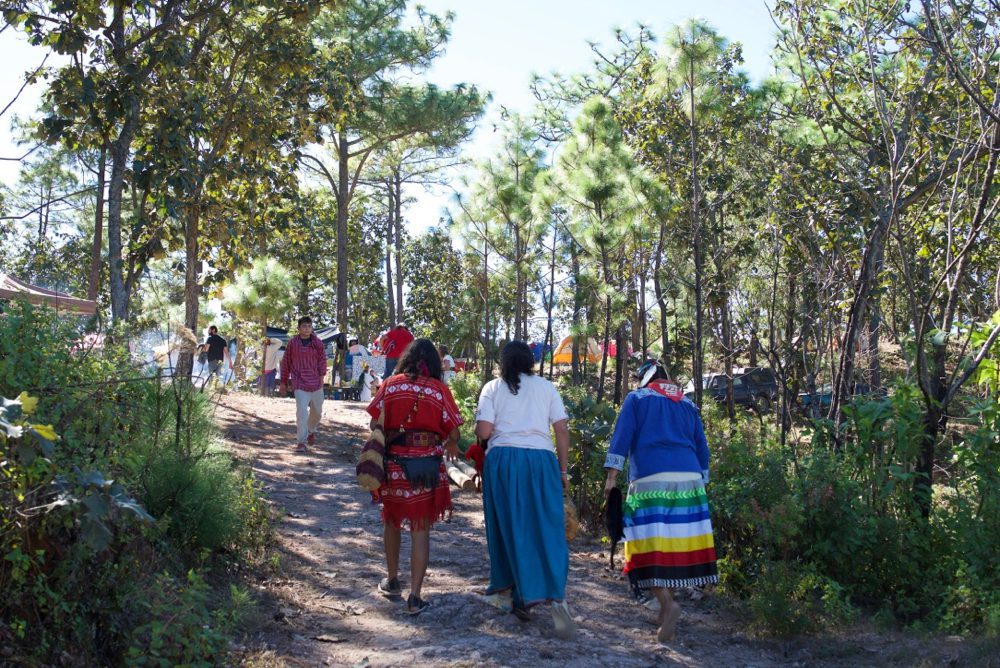
Sovereign economies meet basic needs while allowing people to focus on relationships with each other and the Earth. (Photo:Anna Katarina Jones)
Tracy: What are your hopes and goals for the gathering in the Black Hills?
Cheryl: It is time for the gathering of sovereign economies and celebration of people who have traditional skills living in balance and harmony with the Earth, her waters, her life-giving plants and animals, and most importantly, uniting the people to stop the destruction of the planet by embracing the teachings that are tied directly to the Earth, the family and the sustainability of sovereign economies handed down within families.
I want to bring women to the Black Hills not only for their stories of sovereign economies but also for their prayers at our sacred sites. I’ve been to sacred sites all over Mexico, and I want to bring these prayers and tobacco offerings to our sacred sites so we can put gifts up there – and they might be temporary and they might blow away, but that’s how it’s supposed to be.
I’m not here to build a church. I believe in temporary altars because we’re a temporary people who have sustained ourselves with our ceremonies and our language – and we’re still here.
But the blessings that we have — those are the things we put on our altar, that we want to protect. The seeds, the plants, the food, the good vibrations, etc.
This gathering in the Black Hills is to empower women. I have learned that whatever is happening – a potluck or a picnic or a movement – women bring their children and their families.
Men will always be needed; they carry the seeds – and have a vital role. But the issue today is that they are part of the patriarchy. They’ve been uplifted by the church; they’ve been uplifted by the state; and they’re hanging onto that, because that’s what been offered up, but it can turn into a crutch or a cane. We are in a place that we couldn’t get out of without them sticking their hands in and lifting us up and pulling us out – and the churches did that, the state did that.
And it works for the men — but it doesn’t work for women. If it worked for the entire community, there wouldn’t be any rapes, there wouldn’t be any murders, there wouldn’t be any child abuse, there wouldn’t be anybody starving in the communities. I know a lot of people go hungry. But when you have a sovereign economy – You’re not a grasshopper; you don’t eat every blade of grass you see. You have a sustainable economy that you can pass on to your daughter, you can pass on to your family.
The men have always surrounded the women; they are our protectors. We can’t live without men, and they can’t live without women. I guess as individuals maybe some can – but as a community, we cannot.
So yes, there will be men there – but I’m not inviting them personally, not right now, because it’s a women’s gathering. However, if a man shows up and says, “I want to work with a men’s group on how to protect the sacred,” I’d invite him to every gathering because that message is most powerful when it comes from a man. I already know that families are coming that naturally have a masculine presence. So yes, men will be at the gathering.
I want the women to empower each other, I want them to support one another, and I want them to experience what empowerment really is, because it’s really about uplifting one another. Women are a part of so many institutions that don’t lift us up and don’t hear our voices, and we’ve had to almost isolate ourselves and insulate ourselves from these institutions, insulate them from hurting us, because they don’t listen to us.
I believe men’s circles are needed just as much as the women’ circles are. I believe that men need to start talking about self-discipline. I believe men need to discipline other men who are abusing the Earth and abusing women. Because this is what I’ve learned and this is what I’ve seen with my own two eyes.
When you have a sovereign economy that a family practices in the home – it’s the woman in the home that’s doing it. What I’ve seen is that as the woman is becoming empowered, she is empowered to have an equal relationship with the man, and they have a partnership where both are in balance, and both see the strengths that they each have in the home.
In America it’s really off balance because the men are in charge, and if there’s domestic violence going on, it’s hidden. If there’s incest going on, it’s hidden. All these things that aren’t natural to us are going on in the home. The way our families are set up to be male dominated, that’s part of the reason why women have no voice. I want women to be empowered to create a sovereign economy. I want that balance to be restored in the family.
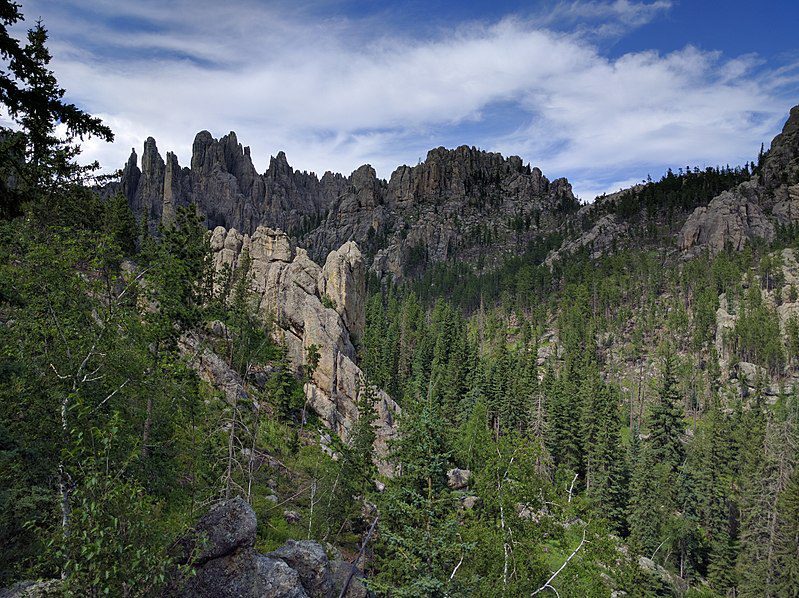
Driving along the Needles Highway in the Sacred Black Hills of South Dakota. (Photo: By Runner1928– Own work, CC BY-SA 4.0)
Tracy: What should people expect if they come to this event?
What I want is for the women to get together and figure out how they’re going to keep their place safe and keep everyone in balance – I want to see them use consensus. I want them to say – “OK, we’re all sitting around the table now. How are we going to have this community up for a week? How are we going to set up the place? What’s the best place to put the composting toilets up? If needed. Where’s the best place to feed people? Where’s the best place for ceremony to be happening? Where are we going to park all the cars?”
I don’t want to create spaces and then say, “OK, here, here, here, here’s all your places.” The land is pretty large and the practice of using common sense and consensus will be adhered to in order to teach the value of each and every person’s voice and place.
I want the women to volunteer to prepare the meals and take care of elders, and keep busy till everything is finished. We’re great at that!
One of the things that amazes me in Mexico is their food sovereignty – they protect their backyards and they grow the most incredible foods. They’re all superfoods, in my opinion, because they’re not full of chemicals and pesticides. So the menu’s going to come from these sovereign homes, these sovereign economies – from the women who bring recipes passed down. So it’s about sovereign food. It’s about empowering women. It’s about protecting the seeds from your grandma’s garden.
Tracy: You mentioned that training for non-native allies will be mandatory for all campers, sponsors, and volunteers. What would you like for non-native people to know about in terms of that dynamic that has come up in past organizing efforts?
Cheryl: We have enough cheerleaders – and it’s good to start out as a cheerleader. That’s good to hear, but I need allies to say, “Cheryl, I know that you have this project, and I am going to stand beside you because I see the importance and the relevance of it, and I know that information needs to be shared across the board – so I’m going to stand beside you and I’m going to do what I can to support you – other than just words. We have enough words; we need action.
So the things that do the most harm in the community are INACTION against racism, bigotry and the lack of good people standing up to stop bad behaviors, right there in their community. If I can say, “Hey Tracy, good job, I’m working with you and I support your project,” then I can also be saying, “Tracy, what you said is racist. You need to stop saying racist things here, change your behavior, because this community doesn’t support racism.” Words chosen to that effect that won’t escalate the situation.
Tracy: Indeed! We all need to practice speaking the truth to those around us. Is there anything else that I haven’t asked? Closing thoughts and reflections?
Cheryl: I want to empower the women so they can go back into their communities and feel safe and be confident that they are not alone, and that they have tremendous value and responsibility in their own homes, to offer sustenance to their families; and their men, in the form of traditional teachings. Women raise children, and we want to raise them to be sovereign and work in balance with Mother Nature. We cannot raise them to sit and be idle. Our children must be safe inside the home learning the skills from the parents on how to be self-sufficient by the time they are in their late teens.
Ultimately I want a school based on sovereign economies where the children will be taught the skills to create and express using their hands, their brains and their hearts. So this is just the first step. It’s more than just a women’s gathering. It’s the creation of a safe community where everything that tribal people have can be protected and practiced. I want a school that’s not tied to the government. I want a free autonomous school where all these teachings can be taught.
All these practices need to be alive, in practice – the language, the culture, the traditions. And our children need to see it. So this weeklong gathering of women is just so that everyone can learn from each other on how to set up a safe community based on a sovereign economy – a balanced community, each with safe spaces, to work from.
It’s a dream-led project, and I’m dreaming of a community for women and their families to live in harmony with each other, their partners, their neighbors, and their environment. What matters is living in balance, with peace as a goal. It’s vital to our communities that they have a sustainable economy; they’re talking their language, they’re practicing their culture.
People told me a long time ago, nobody wants to go back and live in the olden days. People are not going to give up their jobs, they’re not going to go backwards – people think we lived in caves and that it was a forced hardship to live. Going back to the ways of our ancestors doesn’t mean living in hardship. I just want to have an option for people who do want to live with sovereign economies in their homes, who want to live with their language and culture, who don’t want to be tied to the system. People shouldn’t have to send their kids to a school that teaches them to support a system responsible for creating trash, displacing people, stealing water, and destroying the habitats the animals live upon. I know there are people who want to live in peace with the Earth.
So that’s what the end game is for people who live in harmony with the Earth in a sovereign economy and a healthy family and a community that makes decisions based on consensus and what’s good for all of the people, not necessarily for the bank account.
Tracy: How can people support this initiative?
Cheryl: Here is our GoFundMe link. We are raising money to cover travel expenses for elders and activists of limited means. If you can’t come, you can still support the event by pledging an amount to help us cover costs.
Cheryl Angel is a a Sicangu Lakota Spiritual Activist and Water Protector. She is a former spokesperson and occupant of Sacred Stone Camp at Standing Rock.
Photos by Anna Katarina Jones unless otherwise indicated.
Next up: Mexico Through Lakota Eyes. Revelations and transformations from Mexico’s traditional and sustainable communities.

All images byAnna Katarina Jones unless otherwise indicated.


